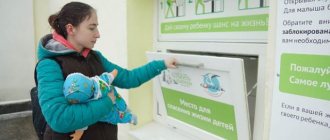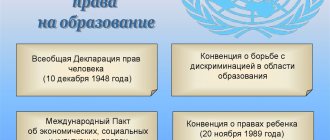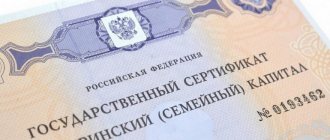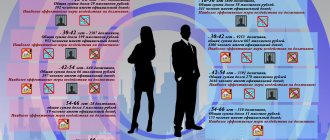Home / Family law / Children's rights
Back
Published: 08/14/2018
Reading time: 7 min
0
727
In Russia, every citizen has a wide list of opportunities that are prescribed in the Constitution of the Russian Federation. Even the smallest resident of the country has his own rights and responsibilities, which he does not even think about, but parents and special authorities monitor compliance with the privileges given by law.
- Rights and responsibilities of a child according to the Constitution of the Russian Federation Rights and responsibilities of a child from birth
- Rights and responsibilities of a child from 14 years of age
- Rights and responsibilities of a child from 16 years of age
The list of rights is quite long and every adult and child needs to know about them at least briefly.
⚖ Legal regulation
According to Russian law, all citizens under 18 years of age are considered children. Rights are benefits guaranteed to the child by the state that he can dispose of. The duties include a range of actions that must be performed by the child.
The rights of the child in Russia are guaranteed simultaneously by several legislative acts, including the following:
- Family code. In Art. 56 enshrines the child’s right to protection of rights and interests. Parents or guardians are the guarantors of children's rights under family law. In relation to children without parental care, the protection of rights and interests is entrusted to the administration of the institution in which such children are located.
- Convention on the Rights of the Child. In Art. 4, 19, 33 provide for measures to protect children from external threats and the development of social support programs for children and their parents.
- The Federal Law “On Basic Guarantees of the Rights of the Child in the Russian Federation” indicates the powers of authorities in this area, as well as the possibilities of ensuring the rights of the child by medical, pedagogical, social personnel, etc.
- Federal Law “On Education”.
What do you know about the UN Convention on the Rights of the Child
The Treaty was adopted in 1989 by the UN General Assembly. Work on it has been carried out since 1979, when international affairs professor from Poland A. Lopatka proposed the draft Convention. Before this, there was the Declaration of the Rights of the Child, which was adopted by the UN in 1959. It focused on 10 provisions, which stated that those responsible for raising children are obliged to give the best to children and act for their benefit.
The Convention on the Rights of the Child, in short, contains everything about the rights of the child. The main document of international law concerning children's rights is the UN Convention on the Rights of the Child. All countries that have acceded to the Convention turn to it if controversial issues arise in protecting the interests of children, or if the country’s legislation does not provide for a specific case. The word "convention" means "international treaty". This treaty addresses all possible rights that countries must provide to children growing up in them.
More to read —> Is it possible to additionally divide property after concluding an agreement on the division of property?
When does a child have rights according to the RF IC?
When a person has reached the age of 18, he is, by law, endowed with many rights and responsibilities, but despite his age category, every person has the opportunity to enjoy some privileges. According to the RF IC, a child’s rights arise from the moment of birth, and with age, their list will only increase.
In accordance with the text of the family law, from the moment of birth, the child has the following rights:
- receive a first name, last name and patronymic;
- have citizenship;
- live in a full-fledged family;
- to be respected by others;
- develop comprehensively;
- to receive preferences from government bodies in the form of benefits and allowances;
- be protected by parents or guardianship institutions;
- to have any property.
According to the law, the list of rights of children grows with age. Especially in the following years - at one and a half, at 3, 6, 7, 10, 14, 15, 16 and 18. Along with age and with the acquisition of more and more rights, the child has more obligations. But for his parents, on the contrary, the older their child is, the less responsibility they have for him.
What laws regarding children's rights exist?
Any rights must be supported by guarantees. If we talk about such a category as children, then their regulation occurs in accordance with the following documents:
• The Constitution of the Russian Federation as the fundamental law of the country; • Family Code of the Russian Federation; • Federal laws of the Russian Federation; • Convention on the Rights of Children, which was approved by the United Nations Assembly.
The Convention on the Rights of Children is a document that provides a guarantee for this category of the population. However, he is not the only one influencing this area. For example, the Declaration also includes important aspects and touches on such complex issues as the protection of orphans and disabled children, protection from abuse and violence. Today, when there is evidence of many outrageous situations confirming the blurring of the moral and ethical boundaries of society, these points should be given special attention. The Declaration also protects other rights. Few people know about the existence of some of them, however, this document confirms that today they are extensive and varied. For example, this is about the secrecy of correspondence or telephone conversations, the secrecy of data (such as information about personal life or adoption), protection from coercion to work in hazardous enterprises, and so on.
Minors and minors
The law divides this category of the population into “minors” and “minors”. It is important to understand the difference between these concepts, because depending on which of them a citizen belongs to, he will have different rights enshrined at the legislative level. Children who have not reached the age of 14 are considered minors. Until this moment, all issues that concern their lives can only be resolved by legal representatives: parents, guardians or adoptive parents. From the age of 14, when a person becomes a minor, the law allows him to independently manage his own income, make some transactions, make deposits in credit organizations and exercise copyright.
Does the state protect children?
Government authorities must ensure that all children's rights are respected. By and large, this is the responsibility of guardianship and trusteeship institutions. In serious situations, authorities such as the prosecutor's office and the court may intervene. If necessary, parents (adoptive parents or guardians), as well as the citizen himself, whose rights have been violated, can protect them at the legislative level: for this it is necessary to fill out an application and send it to the prosecutor's office for consideration. She will refer the case to the court, which will take the appropriate decision.
Social protection
Every citizen who has not yet reached the age of majority has a full right to social protection. He must have all the conditions so that he can unhindered spiritual, intellectual and physical development. His social rights should not be suppressed. The purpose of each legislative act of the Russian Federation concerning children's rights is to ensure the interests of citizens under 18 years of age.
Family law
Family law presupposes the harmonious development of a person in conditions of love and understanding that can be obtained in the family. Parents (natural or adopted) can create a suitable atmosphere for a person’s happy life during childhood. The basis of the family right of children is to remain with their mother, separation from whom can be allowed only in certain cases. The state and society must take care of those who do not have a family and financial security. Large families are also subject to special attention: they should be provided with state benefits that will help maintain the financial well-being of the family.
Right to study
By and large, a person’s entire future life depends on the education received. For this reason, the Civil Code of the Russian Federation provides for free education at school. Legislative regulation of the education system allows for:
• cultural development; • development of personal judgment; • education of moral responsibility.
In the future, these qualities are useful for society, which provides citizens with free education. But not only the educational institution is responsible for learning outcomes: parents must also contribute to this process, providing children with all the conditions for educational activities.
There are different types of rights that are associated with education.
Therefore, children have the right to: • Be trained using an accelerated course. • Use of various information resources. • Receiving additional education. • Education in your native language, or in any other language provided by the state educational system. • Transfer to another educational institution when the current educational institution ceases its activities. • Defending one’s own decision to change the vector of education if the child is not satisfied with his future profession. • Realization of the child’s desire to receive higher education.
Right to medical care
Every minor or minor citizen has all the rights to receive qualified medical care and can:
• Undergo treatment and observation at a dispensary; • Use benefits for the provision of medical care; • Receive information about your own health status in a form that is accessible to the child’s age; • Be trained and work in conditions that do not have a negative impact on the child's health. In the Russian Federation, children over 15 years of age can provide voluntary consent or refusal of medical care in writing.
Property rights of children
An important aspect of the law on fundamental rights of a child is his rights to his own property. Children have housing rights, rights to property acquired through personal financial means, as well as rights to property donated or inherited to them. The Civil Code confirms that children can freely dispose of their own property.
Responsibilities of parents to support children
Everyone has the right to be supported by their parents until they receive an education. If one of the parents receives alimony, then these funds can be spent on the maintenance of a minor citizen. The amount of alimony is determined by the court: however, it cannot exceed 25% of the earnings of the citizen who pays it. Moreover, he can also deposit funds into the child’s bank account: upon reaching the age of majority, the account owner can dispose of these funds at his own discretion.
Here are the most basic rights of children in the Russian Federation. In fact, their list is, of course, much more diverse and extensive. In order to ensure a decent future for their children, parents should know what they are entitled to by law.
What rights does a child have in the Russian Federation?
- “Convention on the Rights of the Child” (approved by the UN General Assembly on November 20, 1989, entered into force for the USSR on September 15, 1990);
- Constitution of the Russian Federation;
- Family Code of the Russian Federation;
- Federal Law of November 21, 2011 N 323-FZ “On the fundamentals of protecting the health of citizens in the Russian Federation”;
- Federal Law of December 29, 2012 N 273-FZ “On Education in the Russian Federation”;
- Federal Law of July 24, 1998 N 124-FZ “On the Basic Guarantees of the Rights of the Child in the Russian Federation”;
- Federal Law of December 21, 1996 N 159-FZ “On additional guarantees for social support for orphans and children without parental care”;
- Federal Law of November 24, 1995 N 181-FZ “On the social protection of disabled people in the Russian Federation.”
Information must have a favorable moral orientation and contribute to the full physical and mental development of the child. He must be protected from other information that is harmful to the well-being of the child, including at the legislative level.
May 15, 2021 lawyerrp 167
Share this post
- Related Posts
- Provide a certificate
- Is a child’s place in the kindergarten provided for the kindergarten staff?
- Top up a pensioner's social card through Sberbank
- Are payments required for receiving the Order of Honor?
Children's responsibilities as they grow - from infancy to adulthood
Already at the moment of birth, certain responsibilities are imposed on the child. For a child, their list is small, but as he grows up, new obligations fall into the range of his responsibilities. Starting from infancy, the child should:
- obey mom and dad;
- accept their care and education with the exception of rough and cruel treatment;
- follow the rules of behavior at home, in public places, and educational institutions.
The student is obliged to receive basic general education - this is 9 grades, which is monitored by law by parents. But parents cannot force them to go to college and graduate: this is the child’s voluntary choice.
Children do not need to go to school every day; parents may find family or homeschooling options more suitable for their children. The difference is that with family education, children are taught by their parents, and then the children take final exams at school, while with home education, teachers come to the children’s homes.
The responsibilities of a 14-year-old child are expanding. So, it includes obtaining a Russian passport and complying with school regulations.
At the age of 17, boys are required to register with the military and receive a registration certificate.
Until the age of 18, parents must support their children: pay for their basic needs, utilities, etc. Parents determine the amount and composition of such support independently, taking into account their capabilities.
Until they reach adulthood, children are relieved of the responsibility to provide for themselves and they are not required to compensate their parents for their expenses even as adults.
Did you know that children have rights guaranteed to them by law?
I know I don’t know I heard about something I think that the parents have all the rights
The right to live in a family with parents who are obliged to provide for their child
Both the father and mother of the child must provide for their child, and it does not matter whether the parents live together or not. As a rule, parents can agree on their own how they will provide for the child. Some people buy clothes, and others, for example, food. If a parent does not fulfill his or her responsibilities properly
, then you can sue him and collect alimony. Both one of the parents and, for example, the child’s legal representative, guardian, adoptive parent, etc. can file a lawsuit. If there is no one to protect the interests of the child, the guardianship and trusteeship authorities can file a claim.
As for utility bills, the responsibility for paying them also falls on the parents. If debts have accumulated before a child reaches the age of 18, then upon reaching adulthood, the child does not have to pay off this debt - this is the responsibility of the parents. With the onset of adulthood
the child begins to pay only those utility bills that were accrued to him after he turned 18 years old.
If a child under the age of 14 has committed some offense and damaged, for example, someone else’s property
, then the responsibility for compensation also falls on the parents.
Waiver Conditions
Current regulatory legal acts also provide for cases where offspring are exempt from the obligation to support their parents. First of all, this is due to the fact that the latter evaded their duties. This is established during the trial process when the offspring do not agree with the claim. Parents who have been deprived of their rights will also not be able to count on support. Also, minors or children recognized as disabled are not required to provide maintenance.
What measures can be taken to protect children
The Federal Law on the protection of the rights of minors indicates the priority of this legal area.
The range of measures to protect this category of the population is quite wide. Depending on the area of application, these measures may vary in nature. The greatest number of issues arise in the areas of education, health care and family relationships. Let's look at some of them in more detail.
The sphere of education
The legislator provides all children with the opportunity to receive preschool, as well as primary, secondary and higher education free of charge.
In other words, any child has the right to attend kindergarten, school, and enter university for a free place. All major issues in this area are regulated by the Education Law.
It is built on the principles of ensuring free and accessible education, respect for the interests of the child, and the right to study in one’s native language.
All educational processes must be built taking into account the interests of children, without violating their dignity and rights. This is especially true for minors with developmental disabilities and disabilities. They have the same rights to education as other children.
Family sphere
On the one hand, the family and its private life are inviolable. But on the other hand, complete non-interference in this area can lead to adults’ abuse of their rights and infringement of children’s interests.
Parents are supposed to take care of their children, ensure their normal development, and protect their interests.
At the same time, we are talking not only about material support, but also about creating a psychologically and emotionally favorable area for life.
Children have the right to live with their family, communicate with their parents and other relatives, express their opinions, and receive financial support.
If parents do not fulfill their obligations properly, coercive measures may be taken. These include the collection of child support payments, deprivation or restriction of parental rights.
If crimes are committed against minors, criminal or administrative punishment is applied.
Categories of children
In accordance with Art. 1 Federal Law No. 124 of July 24, 1998, a citizen of the Russian Federation who has not yet turned 18 years of age is considered a minor. A similar term is specified in the RF IC.
There are 2 categories of children: minors and minor children. These concepts have their differences.
A citizen of the Russian Federation aged 0-13 years is considered a minor. Children aged 14-18 years are considered minors.
Attention! Until the age of 14, a minor is considered incompetent. Without taking into account his personal opinion, guardians, parents or adoptive parents make transactions or other various legal actions. After reaching the age of 14, a citizen of the Russian Federation acquires partial legal capacity (the right to carry out small transactions); from the age of 18, full adulthood begins.
The right to communicate with parents after divorce and relatives
Nowadays it is quite rare for spouses to live together all their lives. However, parental divorce should not in any way affect communication with the child.
and other relatives. Spouses may be exes, but parents are not.
Spouses must independently agree on how they will communicate with the child, at what time, how many times a week, etc. If it is not possible to reach an agreement peacefully, then the order of communication with the child is established by the court.
Not only the father or mother, but also the grandmother or grandfather
.
If the court has determined the procedure for communicating with the child, but the mother is still against it and prohibits seeing the child, then she may be fined.
⭐ Rights independent of age
All inalienable rights of Russians under the Constitution also apply to children. Accordingly, children have the right to safety, health, education, work, private property, etc.
The basic rights of the child are enshrined in the Family Code. Among the most important legislative guarantees, children are provided with:
- The right to life and upbringing in the family.
- The right to know your parents.
- The right to full development and respect for human dignity.
- The right to be cared for by parents and live together with them.
- The right to communicate with parents and other relatives.
- Right to full name.
- The right to express your opinion.
- The right to receive maintenance from parents and family members.
The state guarantees schoolchildren free preschool and school education and treatment . Parents can pay for additional medical and educational services, but only if they wish. Higher education can also be obtained free of charge, but based on the results of a competitive selection.
The child is guaranteed a place in kindergarten on a first-come, first-served basis and in school on a territorial basis. There cannot be any exams for admission to the first grade at school, unless these are additional places.
The child has the right to housing . Until the age of 14, he lives with his parents and consent for his registration is not required. Even if parents rent an apartment in order to obtain temporary registration for a child, they do not need to seek consent from the owner. It is unacceptable to register permanently in an apartment with your grandmother if your mother lives at a different address.
The right of ownership is guaranteed to the child at birth. The child has the right to personal belongings . This could be his favorite doll, or large real estate, for example, an apartment. Real estate can be purchased for a child, gifted to him or inherited.
Children's property rights are additionally protected by the state. Thus, parents cannot sell an apartment in which the child has a share without the prior consent of the guardianship authorities. The latter must make sure that the child’s rights are not violated as a result of moving to another apartment. For example, if a family is planning to move from a three-room apartment to a room in a communal apartment, then this transaction is unlikely to be considered acceptable, and it will be blocked at the planning stage.
When inheriting property, children have priority status under Russian law . They are among the heirs of the first stage and have additional privileges. So, if their father decides to leave the entire apartment to his common-law wife, then the child under 18 will still receive his share, contrary to the parent’s will. He will receive 50% of the property.
Despite the complex of inalienable rights, until the age of 18, parents make almost all the most important decisions for their children: representing them in court, concluding deals, compensating for damage caused, paying taxes and fines, etc.
Rights and responsibilities of minor children
Emancipation is accompanied by a guarantee of certain rights in decision-making and the emergence of additional responsibility. At the same time, parents are no longer responsible for the decisions of the minor and their consequences. Emancipated teenagers are not allowed to drive, vote, or purchase alcohol or weapons until they reach adulthood.
The state guarantees children preschool and school education and treatment free of charge. If necessary, parents can purchase additional paid services in these areas. If the applicant successfully passes the competition, then higher education is provided free of charge. Places in kindergartens are distributed in order, and in schools - on a territorial basis.
Thus, in accordance with Article 5.35 of the Code of the Russian Federation on Administrative Offenses, failure to fulfill or improper fulfillment by parents or other legal representatives of minors of duties for the maintenance, education, training, protection of the rights and interests of minors entails a warning or the imposition of an administrative fine in the amount of one hundred to five hundred rubles.
You may like => Reprimand in the Army For What
Article 14.1 of the Law on Guarantees of the Rights of the Child establishes a list of measures designed to promote the physical, intellectual, mental, spiritual and moral development of children. Not only parents are involved in this assistance. This should be done, in particular:
Medical support
As for health protection, the rights of the child in the Constitution of the Russian Federation also contain clauses regarding health protection. They state that every minor has all rights and freedoms in the field of medical care. He can:
- Get treatment and observation at a dispensary.
- Take advantage of preferential conditions for food and medical care.
- Receive information about his/her health status in a form that, according to the protection of children's rights, is accessible to his/her age.
- Study and work in conditions that exclude the adverse effects of various factors on his health.
What is very important, the protection of children’s rights in the Russian Federation allows minors who have reached the age of 15 to voluntarily agree or refuse medical intervention in writing.
Healthcare costs in the Russian Federation.
Under what conditions do children have equal rights?
Regardless of what citizenship, gender, language, health status, social and property status, beliefs, religion a minor citizen has, he has the right to protection. Children are guaranteed equal opportunities to protect their interests in all bodies, including the judiciary. It does not matter whether the child lives with his parents or is in a government institution.
Also, in the absence of violations of the law, children belonging to the following categories of citizens have equal rights to protection:
- people with disabilities;
- disabled people;
- orphans;
- children who were left without parental care;
- street children;
- offenders.
All children, without exception, are given equal rights. A minor cannot be subject to discrimination based on origin, social or property status, health, nationality, religion, education and other grounds. No one can restrict his rights based on the beliefs, views, position in society or religion of his parents, as well as for other illegal reasons.
Child's rights
At the international and national level, there are many special acts on the rights of the child. The main act on the rights of the child at the international level is the Convention on the Rights of the Child (New York, November 20, 1989) - a document on the rights of the child consisting of 54 articles. All rights included in the Convention apply to all children.
- The child must have all the rights specified in this Declaration. These rights must be recognized to all children without exception and without distinction or discrimination on account of race, colour, sex, language, religion, political or other opinion, national or social origin, property, birth or other status relating to the child himself. or his family.
- The child shall be provided by law and other means with special protection and with opportunities and favorable conditions that enable him to develop physically, mentally, morally, spiritually and socially in a healthy and normal manner and in conditions of freedom and dignity. In making laws for this purpose, the best interests of the child must be the primary consideration.
- The child must have the right to a name and citizenship from birth.
- The child must benefit from social security. He must have the right to healthy growth and development; To this end, special care and protection must be provided to both him and his mother, including prenatal and postnatal care. The child must have the right to adequate food, housing, entertainment and medical care.
- A child who is physically, mentally or socially disabled must be provided with special treatment, education and care necessary due to his special condition.
- For the full and harmonious development of his personality, a child needs love and understanding. He should, whenever possible, grow up under the care and responsibility of his parents and in any case in an atmosphere of love and moral and material security; a young child should not, except in exceptional circumstances, be separated from his mother. Society and public authorities must have a duty to provide special care for children without families and for children without sufficient means of subsistence. It is desirable that large families be provided with state or other child support benefits.
- The child has the right to receive education, which should be free and compulsory, at least in the initial stages. He should be given an education which will contribute to his general cultural development and by which he may, on a basis of equality of opportunity, develop his abilities and personal judgment, as well as a sense of moral and social responsibility, and become a useful member of society. The best interests of the child should be the guiding principle for those responsible for his education and learning; this responsibility lies primarily with his parents. The child must be provided with full opportunity for games and entertainment that are aimed at the goals pursued by education; society and public authorities must make efforts to facilitate the implementation of this right.
- The child should, under all circumstances, be among those who first receive protection and help.
- The child must be protected from all forms of neglect, cruelty and exploitation. It must not be subject to trade in any form. A child is not a commodity
You may like => Social Card Issued at School Already Activated?
Property rights of children
In the law on the fundamental rights of the child, one of the important points is the right of every minor to their own property. This applies to children’s housing rights and property purchased with personal funds, donated or inherited. According to the Civil Code, each child can dispose of his property at his own discretion.
Responsibilities of parents to support children
As for maintenance, the documents on children's rights say: parents must support their children until they receive an education. If the mother (father) receives child support, then, as indicated in the Federal Law, she (he) can spend the funds received on the maintenance of the child.
The amount of alimony is regulated by the court, but the amount cannot exceed 25% of the earnings of the party paying the elements. In addition, the party paying alimony may deposit the amount into a bank account opened in the name of the minor son or daughter. To see what types of alimony are provided for by law, see the following video.
Upon reaching 18 years of age, according to the guarantee of children's rights in the Russian Federation, the owner can use the funds for education or for other purposes.
Brief version of the Convention on the Rights of the Child
The right of the child to use the most advanced health care services and means of treating illnesses and restoring health. All countries have a responsibility to work to reduce child mortality rates, combat disease and malnutrition, and eliminate traditional and unhealthy practices.
Recognition of the principle of common and equal responsibility of both parents for the upbringing and development of the child. In order to guarantee and promote the implementation of rights, states provide assistance to parents and legal guardians in fulfilling their responsibilities in raising children and ensure the development of a network of child care institutions.
- express one’s opinion when solving an issue in the family that affects one’s interests,
- the right to be heard in any judicial or administrative proceedings (Family Code, Article 57.)
- the right to express his opinion about who he would like to stay with after his parents’ divorce (Articles 57, 65).,
- give consent to change your name, surname,
- give consent to the restoration of parental rights,
- give consent to your adoption or placement in a foster family,
- give consent to the appointment of a guardian.
- vouchers for children in organizing children's recreation and their health, including meals;
- feeding children in children's health camps with daytime stay for children organized by executive authorities of the constituent entities of the Russian Federation or local governments;
- travel by intercity transport for organized groups of children to vacation spots and back.
If we are talking about judicial protection, then the legal representatives of children, guardians (trustees), guardianship and trusteeship authorities and the prosecutor can apply as plaintiffs for the protection of their rights. The legal representatives of minors may be parents, adoptive parents, guardians, trustees or other persons to whom this right is granted by federal law (Part 1 of Article 52 of the Code of Civil Procedure of the Russian Federation).
Involving a minor in the systematic use of alcoholic beverages, intoxicating substances, vagrancy or begging, committed by a person who has reached the age of eighteen, is punishable by imprisonment for up to four years (Article 151 of the Criminal Code of the Russian Federation).
More to read —> LLC sk Renaissance life insurer toll-free phone number
If parents do not like the name chosen by themselves or a government organization, they have the right to change the surname or first name, but until their child turns 10 years old. If the daughter or son is over 10 years of age, then, according to legal protection, it is possible to change the child’s last name or first name only if he agrees with this decision.
As for maintenance, the documents on children's rights say: parents must support their children until they receive an education. If the mother (father) receives child support, then, as indicated in the Federal Law, she (he) can spend the funds received on the maintenance of the child.
Every year, prosecutors resolve thousands of appeals related to violations of the rights of children and adolescents, conduct inspections of bodies and institutions working with children, suppress illegal actions of officials at various levels, ensure participation in court proceedings, and take measures to restore the rule of law.
Based on the provisions of the UN Convention on the Rights of the Child, norms of international law and Russian legislation, which establish the priority of the interests and welfare of children in all spheres of life of society and the state, the order of the Prosecutor General of the Russian Federation “On the organization of prosecutorial supervision over the implementation of laws on minors and youth” identifies the main areas of activity of the prosecutor:
Family responsibilities
The rights and responsibilities of minors from 14 to 18 years of age in the family are not fundamentally different from the powers of young children. They are not legally established; they are based on personal child-parent relationships.
A child’s household responsibilities mean respectful attitude towards older relatives, brothers and sisters, taking care of property, and helping with housekeeping. These actions must be performed voluntarily.
TV shows, newspapers and magazines, and the Internet are full of information about the rights of children and adolescents. However, few minors think about compliance with duties and possible liability for violations of the law.
Children's rights in Russia: what they are and where they are enshrined
There is no separate document “Code of the Rights of the Child” in Russia. But Chapter 11 of the Family Code of the Russian Federation is dedicated to minors. Articles 54 and 55 provide them with accommodation and upbringing in a family, provision of material resources, contacts with mother, father and other relatives.
- for life, name, parents;
- to freedom (opinions, thoughts, self-expression);
- for medical care, social security, education;
- to a decent standard of living that promotes comprehensive social, mental and physical development;
- to get acquainted with culture, rest and leisure;
- for protection from exploitation (including sexual exploitation), drug propaganda, and armed conflicts;
- to the presumption of innocence.
May 13, 2021 polrostov 51
Share this post
- Related Posts
- Increase in Insurance Payments for Pension Insurance Speaks About
- Sanatoriums of the Ministry of Internal Affairs of the Russian Federation List
- Sprained Finger Insurance Event? In the Ministry of Emergency Situations
- From what year do they pay for major repairs?
✅ How the rights of minors are protected in the Russian Federation
In case of violation of his rights and legitimate interests, the child may take certain measures to protect them. He has the right to complain about his parents who do not fulfill their duties or perform them improperly, violate his legitimate interests, or abuse his trust.
Family legislation obliges citizens and authorized persons to contact regulatory authorities if they become aware of a violation of a child’s rights (especially if there is a threat to life and health). Neighbors, close relatives, a school teacher, etc. can report abuse.
If someone becomes aware of a crime committed against a child, they can call the “Child in Danger” telephone line, which is organized in all regions, or a toll-free number.
You can also complain about negligent parents:
- to the courts (the child himself has the right to do this from the age of 14);
- to the guardianship and trusteeship authorities at the place of residence;
- to the prosecutor's office or police;
- Commissioner for Children's Rights;
- to public human rights organizations.
The guardianship authorities are required to take action based on the results of the appeal and visit the family. If necessary, employees seek assistance from the police.
When going to court, a child aged 14-18 years can independently defend his interests. Minors are exempt from paying state fees when filing a claim. Based on Art. 23, 24 of the Civil Procedure Code, cases to protect the rights and interests of children fall under the jurisdiction of magistrates and district courts. In particular, the jurisdiction of the magistrate’s court includes the consideration of cases of challenging paternity, restriction of parental rights, adoption, etc.
To file a complaint against parents, you must submit an application and state the facts of violation of the rights of minors. A sample application for deprivation of parental rights of both parents can be downloaded from
link
.
It must be accompanied by documents confirming the birth of the children and confirming the circumstances stated in the application, for example, a reference from the parent’s place of work or from the district police officer.
Rights and responsibilities of minors: main aspects, laws
- From the age of 8, he can be a member of children’s organizations, and from the age of 14, in youth organizations aimed at leisure, creative, and sports activities.
- The state, in turn, is obliged to support such organizations through advertising, co-financing, improving the material base, rights to preferential conditions, and so on.
- Every child has the right to a name. At birth, the baby's name is given by the parents. However, upon reaching the age of 14, he can change his first or last name.
- Immediately after birth, a little person has the right to life, as well as to freedom and privacy. This means that no one can harm him, restrict his freedom, or perform medical procedures that are illegal.
- A minor can freely express an opinion, and it must be taken into account, but taking into account age. For example, when determining the place of residence of a minor during a parental divorce, the opinion is taken into account from the age of 10. And after receiving a passport as a citizen of the Russian Federation, from the age of 14, he can independently file lawsuits in court.
- Minor citizens can choose their religion.
- The minor must be provided with care, care and material equipment. If for certain reasons he does not live with the family, then these responsibilities are assigned to guardians or government authorities.
- He can and should also receive education, including additional education.
- A minor must be protected from violent acts by others, including forced drug use.
You may like => At what age do Labor Veterans receive benefits?
Any modern state pursues a policy to support its citizens. This is especially true for the country’s young representatives. Here, on the basis of current legislation, the rights of the child are determined. However, at present, children's rights are regulated not only by the internal legislation of the state, but also by adopted international documents.
Here, a special place is occupied by the declaration and convention on the rights of the child in the family and beyond. These fundamental documents formed the basis for the formation of the position of the child in the Russian Federation on the basis of the Family Code, as well as the Constitution. In this case, it is necessary to consider in detail how many guaranteed rights a child has, and in addition, what is provided for infringement and violation of the child’s rights.
Other rights of the child
This article shows only a small part of the rights that a child under the age of 18 has. In general there are a huge number of them
:
- right to information;
- the right to personal secrets;
- the right to treatment at state expense;
- the right to freedom of thought;
- the right to a full life;
- right to defense;
- right to property;
- right to education;
- the right to rest and entertainment;
- the right to personal and family life, etc.
You can find out more about all the rights in the Constitution
of the Russian Federation, in
the Convention
on the Rights of the Child, as well as in
the Family Code
of the Russian Federation and other legislative acts, which detail all the rights of a minor that he has in the Russian Federation.
In conclusion, I would like to say that a child is the most valuable thing in life.
, therefore, we, adults, must protect them, provide them with a full life, and also protect them from various attacks on their rights, which they have from birth by law.
UN Convention on the Rights of the Child
- Caring for the comprehensive development of the child, and in particular, in the spiritual, psychological and physical aspects. Parents undertake to provide the child with the opportunity to receive a general education, and all children are required to attend educational institutions;
- Protecting the interests of the child. Parents act as official representatives of the interests of their own child before the law. Therefore, when the need arises, they are obliged to defend his interests and protect his rights;
- Security. In accordance with this point, parents must provide the child with a safe environment for development and life, without using physical punishment and moral pressure as tools of control;
- Financial support for the child. Until the child reaches the age of majority (18 years), the parents are obliged to support him;
- Child education. In this category, special attention should be paid to the responsibility of parents for the behavior of their children, since their educational process will subsequently be reflected in the child’s behavior not only in the family, but also in society.
An important component of the educational process, as a result of which a child is formed as a person, is his receipt of general education. The responsibility of parents to ensure their children the right to receive a quality education is enshrined in the Constitution of the Russian Federation (clause 4 of article 43).
The Convention deals not only with the rights of the child, but to a large extent with the obligations of states parties to ensure the rights of children. Our country has signed and ratified the Convention on the Rights of the Child, which means that children in our country are protected by the UN Convention on the Rights of the Child. By establishing standards on the rights and social protection of the child, the Convention proceeds from the fact that for a child to develop fully and harmoniously, it is necessary to grow up in a family environment, in an atmosphere of happiness, love and understanding. And this is possible only with respect for the personality, honor and rights of the child. And only under such conditions of upbringing can a child be prepared for independent life in a society that is guided by the ideals of peace, dignity, tolerance, freedom, equality and solidarity. Most of the provisions of the Convention are addressed to government bodies, institutions, and organizations, the most powerful authorities that have the real ability to take the necessary and effective measures to protect children. Parents and other family members can do a lot to ensure that the child feels sufficiently prosperous.
More to read —> Benefits for young families Penza
Most of the provisions of the Convention are addressed to government bodies, institutions, and organizations, the most powerful authorities that have the real ability to take the necessary and effective measures to protect children. Parents and other family members can do a lot to ensure that the child feels sufficiently prosperous.
3. The participating States shall encourage and develop international cooperation in matters relating to education, in particular with a view to promoting the elimination of ignorance and illiteracy throughout the world and facilitating access to scientific and technological knowledge and modern methods of education. In this regard, special attention must be paid to the needs of developing countries.
Whereas the peoples of the United Nations have reaffirmed in the Charter their belief in fundamental human rights and in the dignity and worth of the human person and are determined to promote social progress and better living conditions in greater freedom,








